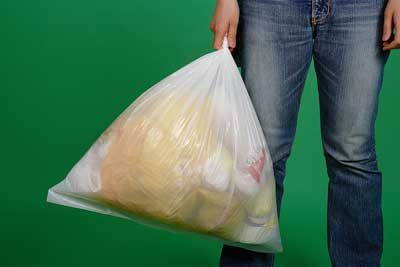(单词翻译:单击)
情景对话
Todd: Marion, can you tell me about the trash? How do I take out the trash?
托德:玛丽恩,你能跟我说说垃圾的事情吗?我要怎么扔垃圾呢?
Marion: OK, let's see. On Monday, Wednesday and Friday, you can leave your burnable trash outside.
玛丽恩:好,我想想。周一、周三和周五你可以扔可燃垃圾。
Todd: What is burnable trash?
托德:可燃垃圾是什么?
Marion: Burnable trash is for example, milk cartons, other paper things, and food as well. You can put all the remains of your food in the burnable bin.
玛丽恩:举例来说,牛奶盒、纸类制品还有食物都是可燃垃圾。你可以把食物残余放进可燃垃圾箱。
Todd: OK, so burnable trash is Monday, Wednesday, Friday.
托德:好,所以周一、周三和周五可以扔可燃垃圾。
Marion: That's right.
玛丽恩:没错。
Todd: OK, what about the other trash?
托德:好,那其他垃圾呢?
Marion: OK, on Tuesday, Thursday and Saturday, you can leave your unburnable trash outside your door.
玛丽恩:嗯,周二、周四和周六可以扔不可燃垃圾。
Todd: OK, what is unburnable trash?
托德:好,那什么是不可燃垃圾?
Marion: Unburnable trash is for example, plastic. So you can't burn plastic, so non burnable, or unburnable. So plastic for example, other things that would harm the environment, if you were to burn them.
玛丽恩:塑料就是不可燃垃圾。你不能燃烧塑料,所以它们是不可燃的。像塑料这种东西如果燃烧会对环境造成损害。
Todd: OK, what about plastic bottles?
托德:那塑料瓶呢?
Marion: That's on Saturday, as well, so you can leave plastic PET bottles and also glass bottles, but in a separate bin. You can leave all those bottles on Saturday, as well.
玛丽恩:那也是要周六扔的,所以周六你可以扔塑料PET瓶和玻璃瓶,不过要装在不同的垃圾箱里。这些瓶子都可以周六扔。
Todd: OK, anything else, like batteries, or clothing?
托德:那其他的东西呢,比如电池和衣服呢?
Marion: Yes, for batteries and clothing there are special days every month, so you have to keep them until maybe one day, or two days in the month when you can leave out things like batteries or clothes, or bigger things.
玛丽恩:每周有特定的日子可以扔电池和衣服,每月可能有一天或者两天可以扔电池或是衣服,或是更大的东西。
Todd: OK, and where do I put the trash?
托德:好,那我要把垃圾放在哪里呢?
Marion: You have to put all the trash in clear plastic bags and leave them just outside your apartment. Just over there, on the left.
玛丽恩:你可以把所有垃圾放进透明塑料袋里,然后把它们放在公寓外面。就在那里,放在左边那里。
Todd: OK. Thanks Marion.
托德:好,谢谢你,玛丽恩。
Marion: You're welcome.
玛丽恩:不客气。
Todd: I might have to ask you again, but thanks.
托德:我可能还会再问你,谢谢你。
Marion: Don't worry. That's fine.
玛丽恩:别担心。没问题。

重点讲解
重点讲解:
1. for example
例如;比如;
eg. For example, air is invisible.
比如:空气是看不见的。
eg. Football, for example, is very popular in the world.
比如,足球在世界上是非常受欢迎的。
2. as well
也;还;
eg. The inverse was surprisingly true as well.
反之,情形也惊人的相似。
eg. People with disabilities have got a vote as well, you know.
你知道,残疾人士也拥有投票权。
3. You're welcome
没关系,不客气;
eg. "Thank you for the information." — "You're welcome."
“谢谢你提供的信息。”——“不客气。”
eg. You're welcome, " he said, his voice choked with emotion.
“不客气,” 他说,嗓音因激动而哽咽了。


